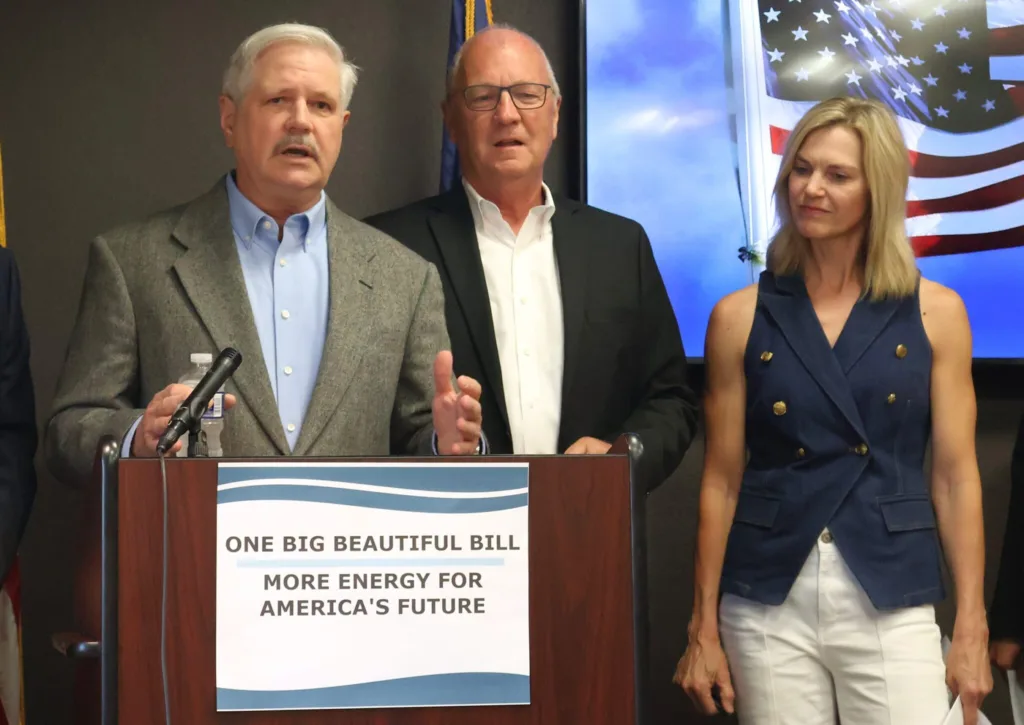

By: Michael Achterling (ND Monitor)
North Dakota’s congressional delegation emphasized the elimination of tax credits for solar and wind projects as part of the federal reconciliation package will be a huge win for coal, gas and oil producers.
The bill was signed into law by President Donald Trump during a White House ceremony on July 4.
During a Monday press conference touting the “big, beautiful” bill at North Dakota Petroleum Council offices in Bismarck, North Dakota Sens. John Hoeven and Kevin Cramer, and U.S. Rep. Julie Fedorchak, all Republicans, took turns at the microphone praising the Republican tax bill and how it will help North Dakotans, the energy grid and the country.
“It’s baseload for the good of the grid, for the stability of the grid. We need 24/7 and that means big, beautiful coal,” Hoeven said. “Here in North Dakota, we’re a big, big part of it. We’re an energy powerhouse for this country and we intend to do more.”
Cramer said the U.S. needed to change its energy policy otherwise artificial intelligence data centers, crypto mining and other quantum computing industries would find homes in other countries.
He also said the country has been subsidizing wind and solar energy sources for about 35 years and those sources are still not able to “stand on its own merit.”
“We’ve actually diminished the reliability of our grid by putting intermittent … electricity on that grid,” Cramer said. “You have to have generation and generation that is available 15% of the time isn’t going to build you many server farms.”
Fedorchak, a former utility regulator, said about 95% of the new power generation hooked into the energy grid recently was from wind and solar projects.
“I wonder why? It’s because we’re telling them that’s what we want with our production tax credits,” she said. “They have to go away. It’s absolutely essential for the reliability of our grid.”
The reconciliation package also expands an existing 45Q tax credit used for carbon sequestration to include enhanced oil recovery.
“Now the incentive is not to put CO2 down a hole just for storage. Now the incentive is to produce oil and gas with it,” Hoeven said. “We can lengthen the lives of our coal plants and work with oil and gas to maybe double what we’ve produced in the Bakken.”
The bill is also expected to cut $186 billion from the Supplemental Nutrition Assistance Program, or SNAP, over the next decade, according to the Congressional Budget Office.
Hoeven said the program will now incentivize states to keep their SNAP error-payment rates below 6% to avoid paying for a portion of the program themselves.
“If you are a state that is 6% or less, you don’t pick up any of the cost share,” Hoeven said. “But the federal government is still saving money because you reduce that error rate. People who should be working and who are not, and are getting food stamps when they should not be getting them, they no longer get them. So the taxpayer still saves.”
In 2022 and 2023, North Dakota’s SNAP payment error rate was 9.5%, according to Legislative Council. The state has averaged a 5.4% error rate over the last 10 years. The analysis from the Legislative Council also projects that North Dakota will see increased costs to administer SNAP.
Hoeven said North Dakota would need to pick up about $6 million per year in new administrative costs under the new cost share formula.
In a statement released Sunday, state Rep. Lisa Finley-DeVille, D-Mandaree, said programs like Medicaid and SNAP helped her family as she raised five children on the Fort Berthold Reservation.
She said Fedorchak, Hoeven and Cramer chose party loyalty and donor priorities over the health and dignity of North Dakotans.
“This bill is a betrayal of our values,” she said. “It gives away trillions in tax breaks to the ultra-wealthy while gutting the basic lifelines that keep our elders, caregivers, and working families afloat — especially in tribal and rural communities.”